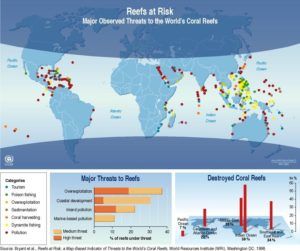Something Fishy is Going On

Climate change is destroying coral reefs around the world and thus is a threat to the scuba diving industry.
Every year, millions of tourists travel across the world to head to warmer climates to enjoy sunny beaches and water sports. In 2012 in the United States alone, water sports made up a $86 billion industry—the largest portion of which consisted of boating [2]. A large portion of people like to take their vacation a step further and truly become one with the sea by diving below the ocean surface for long periods of time—a sport known as scuba diving.
Scuba diving started out as a necessary tactic for search and rescue procedures and was later adapted for military use. The first recorded scuba apparatus was developed by Henry Fluess, an English diving engineer in 1878 [1] (see Figure 1). Since then, scuba diving has taken off both as a branch of the Navy as well as recreationally. As of 2013, there are as many as 6 million active recreational scuba divers in the world who spent over $228 million on scuba gear and experiences [3]. Mares is one company that benefited from this large amount of spending. Mares is a scuba equipment manufacturer that was started in 1949 in Italy by Ludovico Mares. They have since merged with U.S. dive company Dacor to become one of the largest scuba manufacturers in the world [4].
Figure 1
In recent years, climate change has been on the forefront of Mares’ mind. Human-induced global climate change has caused sea-levels to rise, increased air and water temperatures, and changed precipitation patterns. It is now predicted to alter coastal and oceanic environments through a variety of direct and indirect impacts [7] (see Figure 2). For example, the early 1980s brought increasing sea surface temperatures (SSTs) and therefore tropical corals experienced large-scale bleaching and mortality events [5]. Now, the U.S. National Oceanic and Atmospheric Administration (NOAA) has estimated that over half of all coral reef systems in the U.S. are at risk and that some systems are virtually dead [7]. Coral reefs are home to more than 25% of the world’s known fish species [6], so without a home for so many fish the scuba diving industry is bound to suffer.
Figure 2 [8]
Mares is hoping to reduce or reverse the effects of climate change through several tactics. First, they are educating their customers on the effects they may be having on the environment and what those effects are having on oceans and marine life. They have an active blog on their site with such information. Additionally, Mares participates in events such as “Together for Water Protection” [9] which is a conference to raise awareness about ocean protection. While Mares is working to help the cause, a more proactive approach to combat these environmental effects is necessary—especially considering that the reduction of coral reefs could put them out of business. Mares could partner with coral reef conservation organizations such as the National Oceanic and Atmospheric Administration (NOAA) Coral Reef Conservation Program (CRCP) or the World Wildlife Fund (WWF) to support their efforts of protecting these vibrant organisms. They could also organize employee projects to clean up local beaches and oceans as well as educate local businesses and communities on the effects they may be having on climate change. In addition, because they already organize global dive trips, they couple provide similar educational or service projects as part of these excursions.
While Mares is working to educate the public on climate change and how it affects the ocean and coral reefs, it does not seem proportional to how badly the destruction of the reefs would be to their business. There are many options that Mares can do to help reduce or reverse the rate of climate change harm on our oceans. At the current rate, 60% of the world’s coral reefs will be destroyed over the next 30 years [10], so it crucial that Mares and other companies that depend marine life to act now.
(686 Words)
[1] EnviroDive. “Technology and Guts.” http://www.envirodive.com/chronicles_technology_and_guts.html, accessed November 2016.
[2] Outdoor Industry. “Outdoor Economy Report.” https://outdoorindustry.org/pdf/OIA_OutdoorRecEconomyReport2012.pdf, accessed November 2016.
[3] Diving Equipment & Marketing Association. “Fast Facts: Recreational Scuba Diving and Snorkeling.” http:// www.dema.org/resource/resmgr/imported/Diving%20Fast%20Facts-2013.pdf, accessed November 2016.
[4] Mares, “Mission.” http://shop.mares.com/en/mission?_ga=1.224926168.335127421.1478220870, accessed November 2016.
[5] Brown, B. E. Coral bleaching: causes and consequences. Coral Reefs 16, S129–S138, 10.1007/s003380050249 (1997).
[6] World Wildlife Fund. “Fast facts: why coral reefs are important to people” http://wwf.panda.org/about_our_earth/blue_planet/coasts/coral_reefs/coral_facts/, accessed November 2016.
[7] McKay, Bruce, Mulvaney, Kieran, Thorne-Miller, Boyce “Danger at Sea: Our Changing Ocean” http://www.seaweb.org/resources/documents/reports_dangeratsea.pdf, accessed November 2016
[8] SeaWeb. “Reefs at Risk.” http://www.seaweb.org/markets/images/coral_reefs_large.jpg, accessed November 2016.
[9] Mares, “Banding Together for Water Conservation.” https://blog.mares.com/banding-together-for-water-conservation-1161.html, accessed November 2016.
[10] Cesar, Herman, Burke, Herman, Pet-Soede, Lida. International Coral Reef Action Network “The Economics of Worldwide Coral Reef Degradation The Economics of Worldwide Coral Reef Degradation.” http://icran.org/pdf/cesardegradationreport.pdf, accessed November 2016.





It’s quite surprising to see that Mares is not doing more to protect their business model. I agree with your suggestion that Mares should be partnering with conservation organizations to help in efforts to reduce the rate at which the coral reefs are being depleted. Another potential strategic action would be to partner with other scuba diving companies to form a conservation alliance. That way there could be another strong voice in the mix lobbying governments to increase environmental regulations to protect the coral reefs.
It is sad to see that climate change is affecting activities beyond production, activities like scuba diving that are also closely tied to tourism! In Peru, tourism is the third largest industry, and more than 1 million tourists visit Machu Picchu alone in one year! Not many understand though that this industry is at risk if we do not take a closer look and a more proactive stand to protect the environment. In the last few years, for example, Machu Picchu has been affected by heavy rains, floods, and even forest fires in nearby towns. These issues could potentially affect the amount of tourists that Machu Picchu can attract in a given year.
I liked your idea that Mares should provide educational or service projects as part of the excursions, it could be an interesting approach to offer tourists visiting Cusco and Machu Picchu, an opportunity to contribute to the community by doing some volunteer work!
This is such a difficult job for Mares and they cannot combat the effect climate change has on reefs alone. Education is one element to the solution, perhaps with regard to ocean boating safety and pollution, but the larger issue of raising sea temperatures is a global climate change problem. The destruction of coral reefs should be a topic of discussion at the climate change conferences and considered in the same conversation as shrinking rain forests and ozone layers.